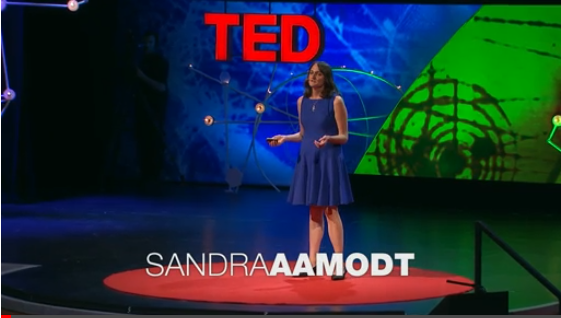First, I think when people hear or speak the word “diet”, they mean one intended to promote weight loss, though diet in its pure sense is what we as individuals eat regularly. Everyone has a diet, whether it’s healthy or not, and some of those diets are more targeted than others. A gluten-free diet is one specifically intended to eliminate gluten consumption. A diabetic diet is one intended to control blood sugar levels. The list of targeting dieting options is probably endless.
Second, I’m a huge TED talk fan. TED stands for “technology, entertainment and design”. TED talks are short, specific, delivered by experts and, to me at least, add an enriching and inspiring perspective to life.
I’m writing about the “Why Dieting Doesn’t Usually Work” TED talk you can link to by clicking the picture above because I found it both educational and personally controversial. The theme of the talk, delivered by neuroscientist Susan Aamodt, is that diets usually don’t work because our brains establish “set points” for how much we should weigh. According to the talk, set points can change – but usually only in one direction – up.
“Usually” is the key word that at first rang funny with me but then made sense. I’ve seen lots of people lose weight following whatever dieting program they chose to help them shed pounds only to see them put that weight right back on plus a few more pounds after they stopped the program. Decades ago, I rode that same weight gain and loss roller coaster myself.
The key to maintaining weight loss is lifestyle change and, you bet, that applies to diet. In the TED talk featured here, Susan Aamodt says that one of the greatest reliefs of her life was giving up dieting three or so years ago in favor of “mindful eating”. The result: she lost 10 pounds and apparently has kept those pounds off ever since.
Terrific! I know how that works myself. After years of trying and failing to lose weight – I hated my “set point” because of how it felt to have an added rubbery band of me around my midsection – I lost weight and kept it off by practicing mindful eating and staying physically active. I ate and drank only what I needed when I was hungry, stopped when I felt that hunger comfortably satisfied, and kept up the exercise. I lost 40 some pounds within a half a year and have maintained the lifestyle that allowed me to do that in the meantime.
Have I fallen off the wagon? You bet. I just wrote about that last week in the “UGH!” piece I posted. The thing is: it was easy to get back on the wagon because it’s the comfortably familiar lifestyle I’ve lived with most my life.
Susan tells her story in the TED talk. My story’s here. She changed her “set point” in a downward direction. I did too. The key: doing it mindfully and sticking to it.

 January 13th, 2014
January 13th, 2014  brucetretter
brucetretter 
 Posted in
Posted in  Tags:
Tags: